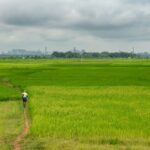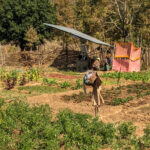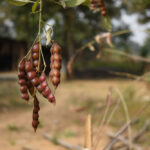Tag: Transformation of Agricultural Systems for Climate Resilience

Researchers and Policymakers Talk Future of Climate-Smart Agriculture
India faces a difficult challenge in the near future: producing enough food to feed its growing population while reducing the stresses agriculture puts on the environment. At a policy dialogue organized by the Tata-Cornell Institute for Agriculture and Nutrition (TCI)…

TCI Publishes 2024–25 Annual Report
The Tata-Cornell Institute for Agriculture and Nutrition (TCI) has published its 2024–25 Annual Report.
The report offers an in-depth look at the full range of TCI’s research and other activities, including grant-funded projects like the Zero-Hunger, Zero-Carbon Food Systems project…

Key Takeaways from a Workshop on Climate-Resilient Agriculture in Chhattisgarh
As climate change advances, India’s rice-and-wheat-heavy agricultural sector is at risk of weakened production because of temperature changes and more frequent extreme weather events, like droughts. In an effort to make Indian agriculture more climate-resilient, the Tata-Cornell Institute for Agriculture…

Chhattisgarh Can Reduce Ag Emissions Through Diversification
India has made enormous progress against hunger by incentivizing the production of staple grains like rice and wheat. Yet, as climate change advances, the country’s dependence on rice is becoming a burden due both to its large environmental footprint and…

Promoting Agricultural Diversification and Climate Resiliency in India
This special policy brief estimates the potential reduction in methane gas emissions from the diversification of agriculture in Chhattisgarh, India. The analysis provides policymakers with information regarding pathways for combatting climate change by reducing agricultural emissions, making Chhattisgarh’s agricultural system more resilient to the effects...

TCI Publishes 2023–24 Annual Report
The Tata-Cornell Institute for Agriculture and Nutrition (TCI) has published its 2023–24 Annual Report.
The report offers an in-depth look at the full range of TCI’s research and other activities, including projects like Zero-Hunger, Zero-Carbon Food Systems, and field research…

Diversifying Farming in Chhattisgarh: What We Know About Agriculture in the State
Rice is a cornerstone of Indian diets, where policies linked to the Green Revolution have helped it and wheat achieve dominance in cropping systems. But methane emissions from rice cultivation play a significant role in exacerbating climate change, and it…

TCI Partners with PRADAN to Improve Agricultural Climate Resiliency in India
Rice is perhaps the most important crop grown in India, where it accounts for roughly a third of all cultivated land. But the relatively high greenhouse gas emissions associated with rice production contribute significantly to climate change, while the disproportionate…

Transformation of Agricultural Systems for Climate Resilience
Rice is one of India’s most important crops, but its production is a significant contributor of the greenhouse gases fueling climate change. The Transformation of Agricultural Systems for Climate Resilience project, administered through a partnership between TCI and the development…

